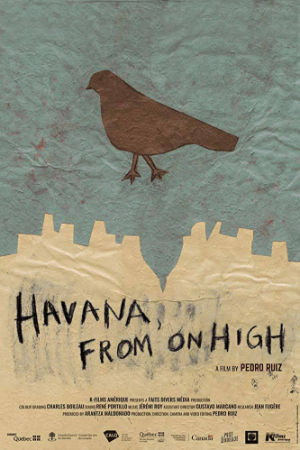
Havana, From on High 2019
Distributed by Grasshopper Film, 12 East 32nd St., 4th Floor, New York, NY 10016
Produced by Arantza Maldonado
Directed by Pedro Ruiz
Streaming, 80 mins
High School - General Adult
Cuba; Documentaries; Urban Areas
Date Entered: 02/22/2021
Reviewed by Terri Robar, Communication, Media, Geography & Maps Librarian, University of MiamiAs a librarian working in Miami, I am always on the lookout for a new film about Cuba. So many times, I have been disappointed to find out it was just another rehash of the life of Castro. For so many years, it was as if no one else lived on that island. I was therefore delighted to watch this film which is all about the common folk of Cuba and politicians like Castro are only briefly mentioned in passing.
Havana is an old city having been founded in 1519. There are many old buildings done in elaborate Spanish-style architecture. In the poorer parts of the city, many such buildings are worn and dilapidated. Yet, these areas vibrate with life. This film looks at a particular group of people who live on the rooftops of these buildings.
Some buildings have what appear to be apartments that were actually built on the rooftops. In other cases, maintenance sheds or other such structures have been adapted to living quarters. Those who can live in these places consider themselves fortunate; they get to live halfway between the earth and the sky. Far enough up to lose the noise and bustle of the streets, they can also catch a cool breeze from the ocean and be able to clearly see the sunrise.
This film interviews several of these people: old and young, male and female, artisans, musicians and unskilled workers. One man raises carrier pigeons for the government who still use this as a means of secure communications (the Internet isn’t safe; no one can hack a carrier pigeon!) We get to see their lives, their families, their pets and gardens, and their dreams.
Since the dialogue of the film consists entirely of the interviews, the film is in Spanish. English subtitles are provided and, fortunately, they are large enough and bold enough to be easily read without distracting the viewer from the visuals.
The stories are woven together in a way that makes them easy to follow. The filmmaker captures both the beauty and the harsh realities of their lives. There is some strong language and frank discussions about certain sexual situations. There are no great revelations in the film; it is merely documenting the ordinary lives of ordinary people.
There are those who will undoubtably dislike this film because it portrays people as being content to live under communism in Cuba. What it really shows, however, is that common people, no matter where they live, are not overly concerned about politics; first and foremost, they are concerned with living their own lives.
Awards:
Official Selection, Hot Docs Film Festival; Official Selection, Chicago Latino Film Festival
Published and licensed under the Creative Commons Attribution 4.0 license. Anyone can use these reviews, so long as they comply with the terms of the license.